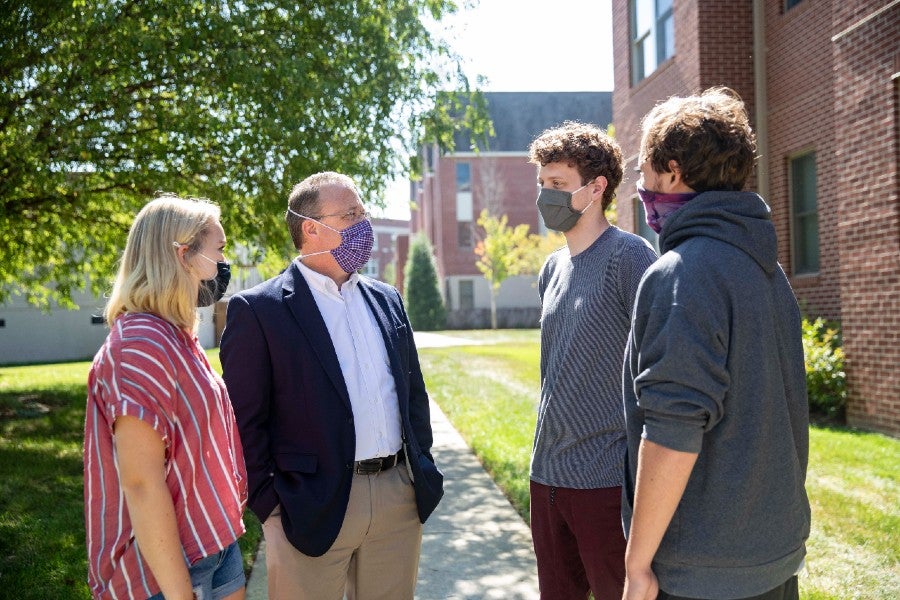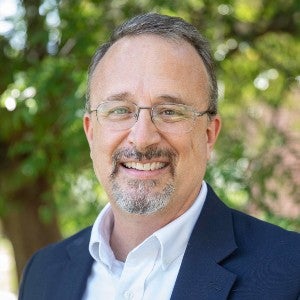New Honors College director wants to transcend academic boundaries
Alan Bradshaw, longtime physics professor, expects many ‘golden moments’ with honors students
Janel Shoun-Smith | 615.966.7078 |

The Honors College’s new director may come from a very different branch of academia than former director Paul Prill, a communications professor, did, but Alan Bradshaw, a physics professor and former department chair, comes with the same love of students and long-time love for Lipscomb that has endeared both men to honors students for years.
Bradshaw first came to Lipscomb full-time 21 years ago, just a year before Prill was taking on the Honors College director’s role. He served as chair of the physics department for nine years, and throughout his tenure he has continuously involved Lipscomb students in research on magnetic fields in the human body, which he conducts through a dual faculty appointment with Vanderbilt University in Nashville.
Throughout his time at Lipscomb, Bradshaw has made it a point to teach honors courses, especially his Honors College freshmen seminar, with intriguing titles like “The Secrets of the Universe,” which uses scientific concepts to show the value of thinking about common things in a different way.
“I have taught honors sections of courses nearly as long as I’ve been teaching at Lipscomb, so I am excited to advance the program as a whole,” he said.

Bradshaw began his study of physics at Abilene Christian University in 1990. Instead of entering particle or nuclear physics, like most of his classmates, he heard a guest speaker talk on biomedical physics and decided that was the route for him. He entered a graduate program at Vanderbilt in what is called living state physics in 1995.
Throughout his career, Bradshaw has used the Superconducting Quantum Interference Device (SQUID) at Vanderbilt to measure the magnetic fields that the stomach and other smooth-muscle organs emit. The SQUID can detect magnetic fields one million times weaker than the Earth’s magnetic field.
As a research assistant professor at Vanderbilt’s Department of Surgery and Physics, Bradshaw and his colleagues in the GI biomagnetism lab are learning to identify specific types of stomach and intestinal disorders by measuring changes in the magnetic fields produced by these organs. His research is a step in the process toward developing an electronic system to diagnose stomach problems the same way doctors diagnose heart problems today.
“Being able to do research has made me a better teacher and vice versa. Keeping up with the latest ideas in the field informs how I teach students to think. It guides the kind of questions we ask in research and the goals we have for what we are doing. There is a lot of synergy in both of those worlds,” Bradshaw said.
From the beginning of his time at Lipscomb, Bradshaw has been as devoted to teaching as he was to his research.
“My first assignment at Lipscomb was the Fundamentals of Physics, a class for non-majors which can be a challenge for teachers. But I loved it and really took up the challenge to make physics accessible and interesting to people who often did not want to be there,” Bradshaw said. “I really enjoyed it when a student could say, ‘Wow! This is cool. I never thought about this before.’”
For the past several years, he has team-taught a course on physics and entertainment, exploring the physics of sound, light and music, as well as another interdisciplinary course on identity and Christianity, exploring, among other things, the Enneagram Personality Test, popular among students today.
“Anytime I can find the opportunity to be in a classroom and talk about things I find interesting and that students also find interesting, that is a golden moment,” he said.
That enthusiasm for overlapping interests will feed his work with the Honors College, he said.
“I think the Honors College is one of the places where you can really explore how to transcend academic disciplines’ boundaries. Dr. Prill did a great job of that. That is my goal as well, to make sure our students are part of a conversation that transcends academic boundaries,” he said. “That should be the goal of the university, to produce a student who is well-read in multiple subjects.”
He applies that goal to his own personal development as well. Admitting his experiences are heavy on the science side, he is looking forward to learning more about the arts majors at Lipscomb. In fact, as a young man he considered possibly majoring in music, and today sometimes plays guitar with the unofficial Lipscomb faculty and staff band Low Expectations.
“Every possible opportunity I can get to understand where our arts and humanities, and business students are coming from, I want to take advantage of those,” he said.
He said he is happy that the Honors College is not an elitist program just for privileged students, but “a program that offers some of Lipscomb’s best students a broader exposure to ideas,” he said.
“The Honors College is a program for athletes, minority students, health students and more. Students have unique abilities, and if there are ways we can help them develop those unique abilities while growing in their faith, that’s really the mission we want to pursue at any cost.”